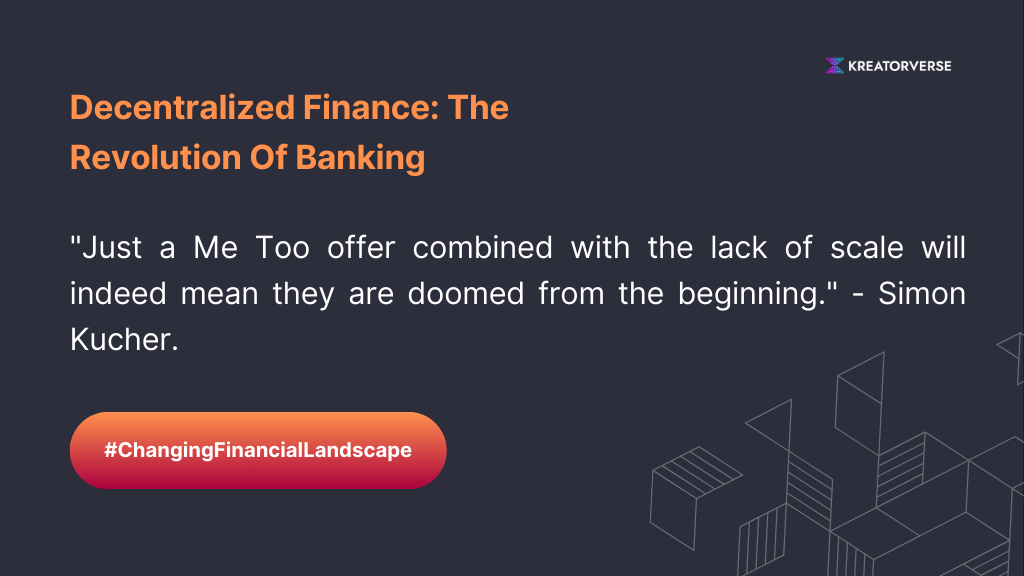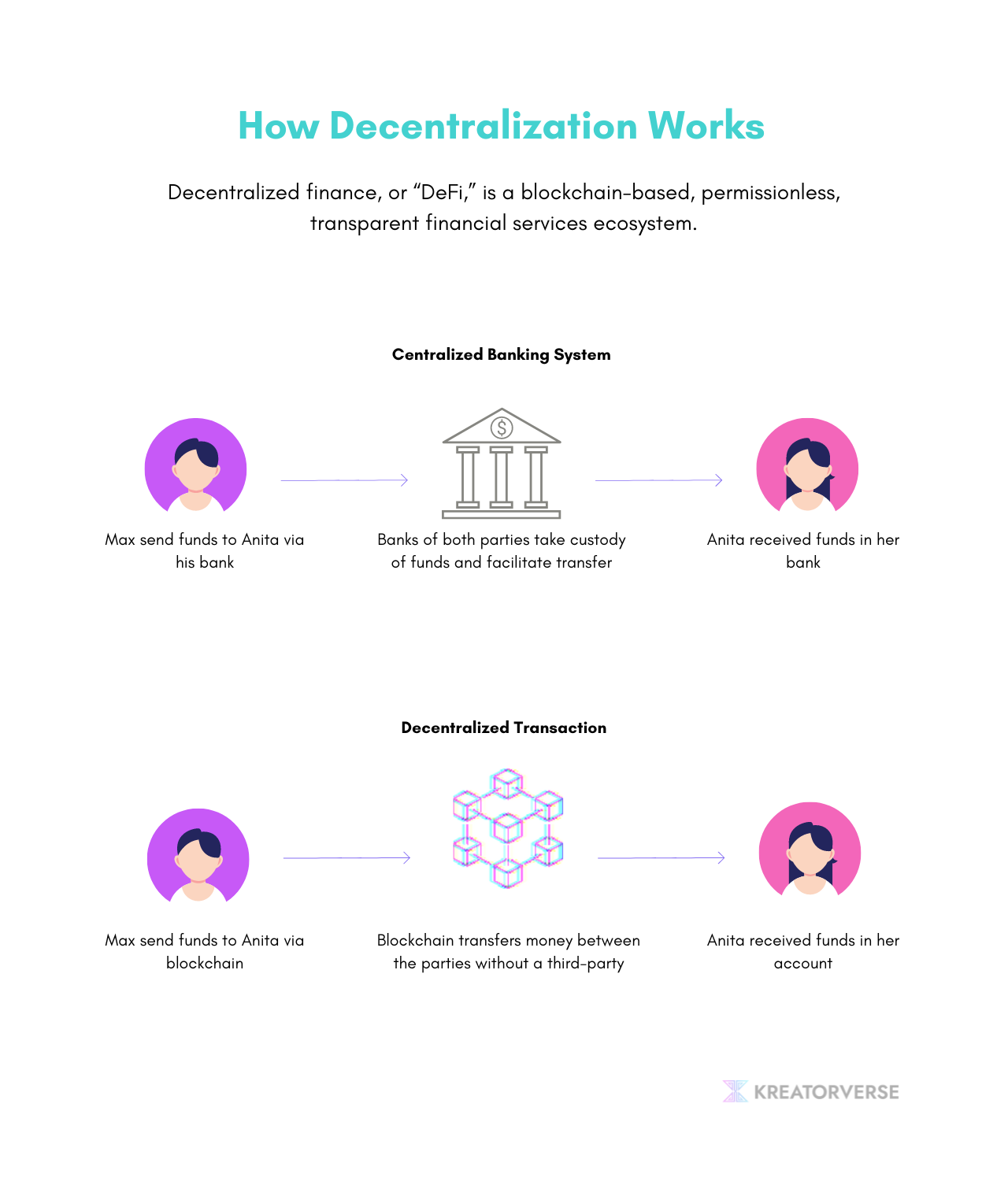Banks—whether traditional or contemporary—are subject to the same principles of evolution and innovation as other consumer services. In the race to stay relevant, DeFi is emerging as the solution for digital banks to ensure their survival and to be in the game for the foreseeable future.
Traditional banks have made strides in digital transformation, offering Internet banking services to stay relevant. However, merely replicating legacy operations on digital channels is no longer enough to thrive in the rapidly evolving financial landscape.
The unprecedented rise of crypto-native Neobanks and fintech disruptors has dramatically raised customer expectations around seamless user journeys, personalization, transparency, and novel product offerings in finance.
Failure to meet new standards risks digital banks facing an existential threat.
A Deloitte report states, “Incumbent banks risk becoming little more than utilities if they fail to match the seamless digital experiences offered by new competition.”
This is where embracing crypto and blockchain technology can catalyze digital banks to transcend traditional boundaries. By integrating decentralized finance (DeFi) within their platforms, banks can unlock new possibilities – from tokenized assets and programmable money to decentralized applications and innovative investment products.
The Challenges of “Banking-As-Usual” in a Disrupted Market
Digital Banks now face a harsh truth – the features that fueled their initial rise just don’t cut it anymore. They have reached an inflexion point. Despite rapid user growth early on, the market is now crowded with over 350 Digital Banks trying to differentiate in a small sandbox.
This has led to three key challenges:
Cookie-Cutter Offerings Leading to Lack of Differentiation
Most Digital Banks provide similar and basic services, such as zero-fee accounts, savings tools, cards, loans, etc., centered on Internet banking. This uniformity makes it incredibly difficult to differentiate and gain a competitive edge.
Acquisition costs are rising as customers fail to see the uniqueness in offerings. At the same time, retention becomes challenging when users don’t see enough value to stay loyal.

Failure to Capture the Attention of Gen Z
With an estimated spending power of $360 billion annually, Gen Z represents a significant opportunity for Financial Institutions.
Digital Banks are vying to get their attention as this generation enters peak earning years. While they have successfully acquired older generations with their Internet banking features, acquiring GenZ users has proven more challenging. Here’s why:
- As digital natives, Gen Z expects cutting-edge experiences and greater personalization from their financial services providers. However, Digital Banks are unable to fulfil these requirements. Their offerings feel unexciting compared to other platforms this generation engages with.
- With crypto coming of age alongside them, 42% of Gen Z investors have allocated funds to cryptocurrencies. This reveals that Gen Z craves digital assets more than older generations.
- Approximately 11% of Gen Z consumers look for integrated blockchain payments when evaluating banking relationships.
- Gen Z women also exhibit a 50% higher likelihood to invest in virtual currencies than their predecessors.
Without adapting their strategies to meet Gen Z’s unique demands, Digital Banks risk losing out on a generation of future customers.
Risk of Losing Market Share to Crypto Platforms
Cryptocurrency exchanges quickly evolve into financial super apps threatening Digital Bank dominance or market share. Leading players like Binance, Coinbase, and Crypto.com allow users to do more than just trade, including
- Crypto-backed lending and borrowing
- High yield accounts for idle crypto
- Crypto payment cards with rewards
- NFT marketplaces for digital collectibles
- In-app access to DeFi protocols
These services mirror Internet banking capabilities with integrated blockchain technology and tokenized assets. Their seamless mobile experiences and crypto-first offerings resonate strongly with new-generation users. A Goldman Sachs survey predicts crypto superapps grabbing significant market share across fintech verticals in the next 5 years.
Digital Banks that fail to embrace digital assets could lose relevance to crypto-focused competitors if they don’t innovate.
Preparing Digital Banks for the Future of Finance with DeFi
Rather than becoming relics of a passing fintech era, forward-thinking Digital Banks need to evolve and cement their place in the future of finance. They can unlock new user value and experiences by integrating cryptocurrencies and blockchain technology. This can help them in various ways:
Attracting Digital Natives with Web3 Experiences
Gen Z has grown up in a decentralized world of social media, user-generated content, and free access to information. This makes them gravitate toward transparency, control, and independence in all experiences – including financial services.
Digital Banks must recognize that this cohort finds baseline Internet banking features monotonous. Their affinity for crypto stems from its transparency, programmability, and unique experience.
By embracing tokenized assets and on-chain finance, Digital Banks can blend these decentralized rails with their friendly front-end banking experience. Offering crypto trading, non-custodial wallets, fractional NFT investing, and DeFi integration allows them to meet Gen Z’s expectations.
We’re already seeing this pay dividends for early adopters. In 2022, Goldman Sachs became the first major U.S. bank to offer an institutional-grade bitcoin-backed loan facility. This allowed its clients to use Bitcoin as collateral for cash loans, bringing crypto into traditional banking services.
Demand for bitcoin loans has been established, but constrained by operational barriers that we’ve addressed with this new capability… This is an important milestone for us as we continue to push product innovation to meet rising client demand for exposure to digital assets in a risk-managed way.
Mathew McDermott, Head of Digital Assets, Goldman Sachs
Such innovative offerings, which cater to client interest in crypto while managing risks, help Digital Banks stay relevant to the digital-native generation.
Expanding Total Addressable Market to Crypto Natives
The meteoric rise of crypto from a niche concept to a $2 trillion asset class has created a new category of users focused on digital asset investing and trading. These crypto-native users are high-value, and their ranks are multiplying rapidly.
As per crypto.com, there are over 300 million crypto users worldwide, including 30 million retail investors in the US. This presents a readymade audience for Digital Banks to tap into.
- By becoming an integrated gateway for crypto investing, they can expand their addressable market multi-fold.
- Seamless crypto trading and custody make them a one-stop shop for crypto natives and traditional users looking to explore digital assets.
The message is clear—integrating crypto can unlock surging demand from retail and institutional investors who seek to participate in this asset class. If digital Banks proactively build crypto-ready offerings, they can significantly expand their user base.
Using DeFi to Position Digital Banks as Future-Forward Institutions
Decentralized finance and Web3 represent a paradigm shift for the future of money. As digital assets go mainstream, organizations must evolve if they do not want to become irrelevant in the near future.
By proactively embracing crypto and blockchain technology, Digital Banks and Financial Institutions can position themselves as forward-thinking innovators ready for the inevitable disruption. They signal a willingness to reimagine finance with the transparency, accessibility, and programmability that crypto offers.
Early adopters who become crypto-ready can shape perceptions as innovators building for the next generation of digital finance. This won’t just be in messaging but a tangible shift in their offerings to show commitment to progressive innovation.
Future-Proofing For the Inevitable Disruption Ahead
The invention of cryptocurrencies fundamentally disrupts how value is stored, transferred, and accessed globally.
It is believed to be the inevitable next chapter in the evolution of money – one that is permissionless and transparent. While the timeline for mass adoption is debatable, the underlying promise remains undeniable.

Digital Banks embracing DeFi potential can future-proof themselves for the decades ahead. Integrating crypto services hedge their disruption risk and provide long-term viability. With digital asset capabilities, they can rapidly adapt as adoption advances across consumer finance.
More importantly, proactive crypto integration creates stickier user bases. Here’s how:
- Early adopters get more deeply embedded in their ecosystems.
- Drives long-term loyalty, as users want to consolidate digital asset management under trusted brands.
Therefore, incorporating cryptocurrency functionality now buffers against disruption risks and shifts in consumer preferences. The institutions taking steps today to offer decentralized financial services will find themselves on the right side of history.
DeFi is the way forward for Digital Banks of all sizes
Digital Banks are at a crucial juncture where they must evolve their offerings beyond essential Internet banking services. Integrating DeFi technologies and cryptocurrencies in banks provides a path to drive differentiation, acquire new demographics, retain customers, and future-proof their business models. Ambitious players who take the crypto route can unlock exponential growth and firmly establish themselves as cutting-edge fintech platforms for the future of finance.
Kreatorverse provides integrated Web3 solutions tailored to the needs of Financial Institutions and Digital Banks. Let us help you tap into a new market by creating compliant crypto products for blockchain-native users and future-proofing your business model.
Take the next step toward the Future of Finance
Future-forward enterprises across the globe trust Kreatorverse
for all things tokenization, deFi, and blockchain.
Together, we can drive the future of finance, with you at the forefront of the revolution.





